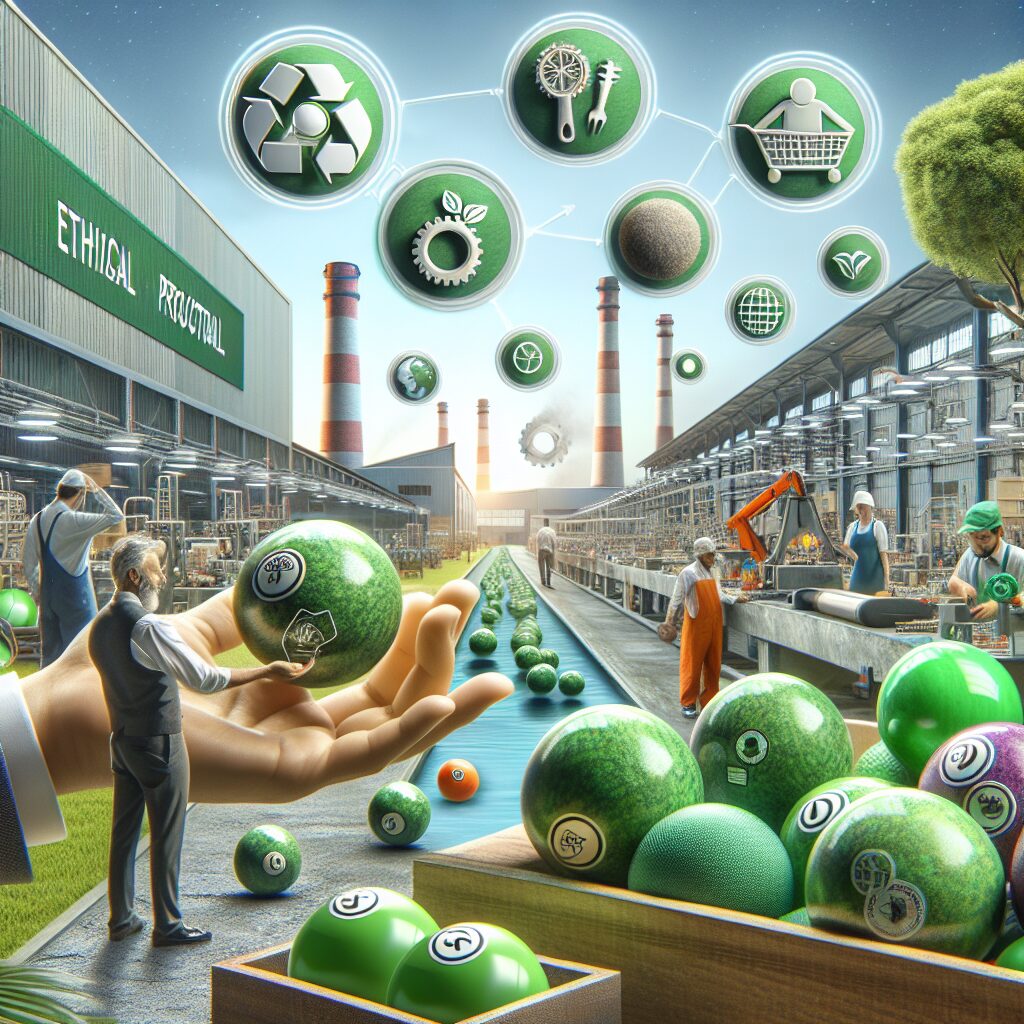Ethical ball production has become an increasingly important topic in the sports industry. As consumers become more conscious of the environmental and social impacts of their purchases, they are demanding more sustainable and ethically produced products, including sports equipment. In response to this trend, manufacturers are embracing innovative production methods and materials to meet consumer demands.
One unique factor driving the trend in ethical ball production is the use of eco-friendly and recycled materials. Traditionally, sports balls have been made from materials like leather or synthetic polymers, which are associated with negative environmental impacts. However, with the advancement of technology and materials science, manufacturers are now able to create high-performing balls using recycled materials such as discarded plastics or even ocean waste. This not only reduces the consumption of virgin resources but also helps in reducing pollution and waste.
In the upcoming sections of this article, we will explore the key takeaways of ethical ball production. Firstly, we will delve into the various sustainable materials and production methods that are being used in the manufacturing process. Secondly, we will discuss the impact of ethical ball production on the overall sports industry, including its role in promoting sustainability and social responsibility. Lastly, we will also shed light on the challenges and opportunities that manufacturers face when transitioning to ethical ball production. So, let’s dive in and discover how the trend towards ethical ball production is shaping the future of sports equipment.
Key Takeaways
1. Consumer awareness and demand for ethically produced sports balls is increasing, driven by concerns over child labor and worker exploitation in the manufacturing process. This has led to a shift in the industry, with more emphasis on transparency and responsible sourcing.
2. Major brands are responding to the demand for ethical ball production by implementing rigorous supply chain audits and certifications. This includes partnering with fair trade organizations, conducting regular factory inspections, and ensuring compliance with international labor standards.
3. The rise of social media and online platforms has given consumers a powerful tool to hold brands accountable. Activists and organizations are using these platforms to raise awareness about labor rights violations in the sports ball industry, putting pressure on brands to take action and improve their ethical practices.
4. Collaboration among industry stakeholders, including manufacturers, retailers, and non-governmental organizations, is playing a crucial role in promoting ethical ball production. Through partnerships and collective efforts, industry-wide standards and certifications are being developed to ensure fair labor practices and sustainable sourcing.
5. Ethical ball production extends beyond worker rights to also encompass environmental sustainability. Brands are increasingly focusing on reducing their carbon footprint, using recycled materials, and implementing sustainable manufacturing processes. This holistic approach to ethical production reflects growing consumer concerns about the environmental impact of the sports industry.
What are the Latest Trends in Ethical Ball Production? Meeting Consumer Demands
The Importance of Ethical Ball Production
Ethical ball production has gained significant momentum in recent years as consumers become more conscious of the impact of their purchasing decisions. With concerns about fair labor practices, environmental sustainability, and social responsibility, the demand for ethically produced balls has grown exponentially. This section explores why ethical ball production matters.
Ensuring Fair Labor Practices
In the realm of ethical ball production, ensuring fair labor practices is of utmost importance. Consumers want to know that the individuals involved in the production process are being treated fairly, paid reasonable wages, and working in safe conditions. Manufacturers are now under pressure to collaborate with suppliers who adhere to ethical labor standards, promoting transparency within their supply chains.
Embracing Environmental Sustainability
Another crucial aspect of ethical ball production is the focus on environmental sustainability. Consumers are increasingly concerned about the ecological impact of their purchases. Manufacturers are now prioritizing the use of eco-friendly materials and manufacturing processes to minimize carbon emissions, reduce waste, and protect natural resources. This section delves into the innovative approaches adopted by manufacturers to produce balls more sustainably.
Supporting Social Responsibility
Ethical ball production also encompasses social responsibility concerns. Companies are recognizing the power of their brands to make a positive social impact. They are aligning themselves with social causes and initiatives, such as donating a portion of their profits to support underprivileged communities or sponsoring programs that promote inclusivity in sports. This section explores the various ways in which manufacturers are engaging in social responsibility to meet consumer demands.
The Role of Transparency and High Standards
Transparency and high standards are key components of ethical ball production. Consumers want to know the origin of the materials used, the manufacturing processes involved, and the impact their purchase has on society and the environment. Manufacturers are now implementing rigorous certifications and audits to provide this information, reassuring consumers that their products meet ethical standards. This section discusses the importance of transparency and high standards in meeting consumer demands.
The Growing Demand for Ethical Balls
The demand for ethical balls is escalating as consumers become more conscious of the consequences of their buying choices. This section explores the factors driving this demand, including increased awareness through social media, ethical fashion movements, and the desire to align personal values with purchasing decisions.
Guides and Tips for Meeting Consumer Demands in Ethical Ball Production
- How to find ethically produced balls: Look for certifications such as Fair Trade, B Corp, or organic labels that guarantee adherence to ethical standards.
- Consider the materials used: Opt for balls made from sustainable materials like recycled or organic fibers.
- Research the manufacturing process: Prioritize manufacturers that have transparent supply chains and promote fair labor practices.
- Support socially responsible brands: Look for companies that actively engage in social causes and give back to the community.
- Educate others: Spread awareness about the importance of ethical ball production and encourage others to make ethical purchasing decisions.
Frequently Asked Questions
1. What is ethical ball production?
Ethical ball production refers to the manufacturing process of sports balls that adheres to ethical principles and responsible practices, ensuring fair treatment of workers, sustainable sourcing of materials, and environmental stewardship.
2. Why is ethical ball production important?
Ethical ball production is important because it promotes social and environmental accountability in the sports industry. It allows consumers to purchase balls that are made without exploiting workers, contributing to deforestation, or causing harm to ecosystems.
3. Are ethical balls more expensive?
While ethical balls may have a slightly higher price tag compared to conventional balls, the price difference is often minimal. The increased cost is justified by the ethical manufacturing practices, fair wages paid to workers, and sustainable sourcing of materials.
4. How can I identify ethically produced balls?
You can look for certifications or labels such as Fair Trade, Forest Stewardship Council (FSC), or Global Organic Textile Standard (GOTS) when purchasing balls. These certifications indicate that the balls have been produced using ethical practices.
5. Are ethical balls of inferior quality?
No, ethical balls are not of inferior quality. In fact, ethical manufacturers prioritize quality to ensure that their products meet the required standards and provide optimal performance on the field.
6. Are there any specific materials used in ethical ball production?
Yes, ethical ball production often involves the use of eco-friendly and sustainable materials. These may include organic cotton, natural rubber, recycled materials, or responsibly sourced leather, depending on the type of ball.
7. How can ethical ball production benefit workers?
Ethical ball production ensures fair wages, safe working conditions, and respect for workers’ rights. It helps uplift communities by providing sustainable employment opportunities and supporting the well-being of workers involved in the manufacturing process.
8. Does ethical ball production help protect the environment?
Yes, ethical ball production focuses on minimizing environmental impact. By using sustainable materials, reducing waste, and implementing eco-friendly practices, ethical manufacturers contribute to the preservation of natural resources and the overall health of the planet.
9. Can I contribute to ethical ball production as a consumer?
Absolutely! As a consumer, you can support ethical ball production by choosing to purchase balls from brands that prioritize ethical practices. By making informed buying decisions, you can encourage more companies to adopt ethical manufacturing processes.
10. How can ethical ball production meet consumer demands?
Ethical ball production can meet consumer demands by offering products that align with the growing emphasis on sustainability and social responsibility. By providing ethically produced balls, manufacturers can cater to the increasing demand for eco-conscious and socially conscious products.
Final Thoughts on Trends in Ethical Ball Production: Meeting Consumer Demands
Ethical ball production is not just a passing trend; it is a necessary shift in the sports industry. As consumers become more aware of the impact of their choices, the demand for ethically produced balls will continue to rise. By meeting these demands, manufacturers can not only contribute to positive social and environmental change but also drive innovation in the market.
Embracing ethical ball production goes beyond meeting consumer demands; it sets a precedent for other industries to follow suit. As we prioritize sustainability and ethical practices, we pave the way for a future where ethical production becomes the norm rather than the exception. It is crucial for manufacturers, consumers, and governing bodies to work together and ensure that ethical ball production becomes an integral part of the sports industry’s landscape.




